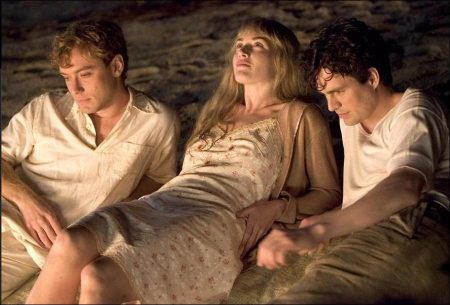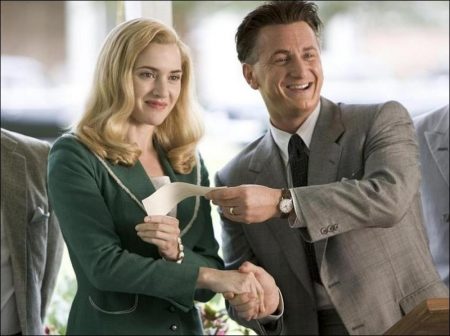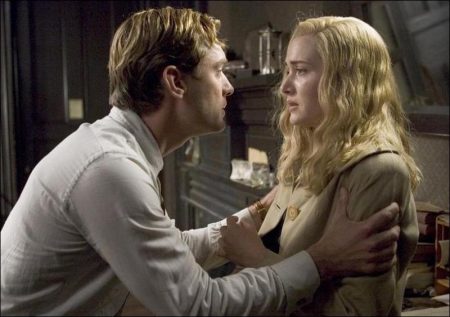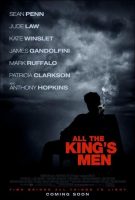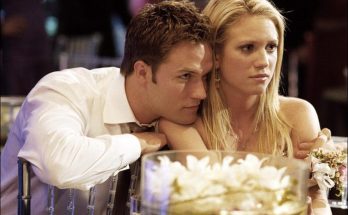Tagline: Time brings all things to light.
Absolute power corrupts absolutely in writer – director Steven Zaillian’s (“Schindler’s List”) adaptation of Robert Penn Warren’s classic novel “All the King’s Men” featuring an all-star cast led by Sean Penn, Jude Law, Kate Winslet, Patricia Clarkson, Mark Ruffalo, Anthony Hopkins.
“All the King’s Men” charts the spectacular rise and fall of a charismatic Southern politician, “Boss” Willie Stark (Sean Penn). Law co-stars as Jack Burden, the once idealistic, now embittered ex-reporter who unwittingly fuels Stark’s corrupt political ambitions.
Based on Robert Penn Warren’s 1946 Pulitzer Prize-winning novel, All the King’s Men tells the story of an idealist’s rise to power in the world of Louisiana politics and the corruption that leads to his ultimate downfall. All the King’s Men is a complex saga of human nature, power, corruption, idealism, romance and betrayal. Using politics as a framework to delve into the more profound dilemmas of human existence – sin, guilt and redemption.
Warren’s acclaimed exploration of morality was inspired by the career of Louisiana governor Huey P. Long and other political demagogues, and has had a profound effect on contemporary literature. Zaillian’s stylized treatment captures the essence of Warren’s novel, infusing it with classic noir elements.
About the Production
Making a screen version of All the King’s Men, Robert Penn Warren’s 1946 Pulitzer Prize-winning novel, one that would be truly faithful to the book, has long been a cherished dream of James Carville.
Despite his electrifying appearance in the Academy Award-nominated documentary The War Room — the story of Bill Clinton’s successful first campaign for the Presidency — Carville is not someone normally associated with the movie business. He’s much better known as one of America’s most famous political consultants and pundits, and as a host of CNN’s “Crossfire.”
But Carville has, in fact, appeared in two movies — Milos Forman’s The People vs. Larry Flynt and Todd Phillip’s Old School — and also co-starred with his wife, Mary Matalin, in the HBO drama series “K Street.” Over the years, Carville has crossed paths with filmmakers, and when the occasion called for it (and sometimes even when it didn’t, he says), he was very vocal about his passion for Warren’s novel and how deeply he wanted to see it filmed authentically.
“People would listen,” Carville says, “and they’d always say to me, ‘This book has never been more relevant than it is today.’ But I’d never agree with them. I’d say, ‘It’s such a classic that there’s never been a time when it wasn’t relevant.’
People’s reactions, though, just show how everyone who reads it is excited by it.” When he was performing a cameo in Old School, he started talking about his driving passion for All the King’s Men to the director Todd Phillips and his associate, Scott Budnick. “Budnick’s reaction was electric. He said, ‘Man, that’s a great idea,’” according to Carville, “and boom boom boom … two seconds later he was discussing it with David Thwaites, an executive at Phoenix Pictures, and with Mike Medavoy, the head of Phoenix, whom I actually knew from the 1992 Presidential campaign.”
Medavoy, who has been associated with some of the most distinguished and successful Hollywood features over the past three decades, had long been aware of the novel and its potential to be a great film. What excited Medavoy even more than its politics was the very human nature of the story. “All the King’s Men uses politics as a framework,” he contends. “But it’s really a story about life, a story about all of us. We’re all capable of corruption, we’re all capable of love, we’re all capable of hatred and betrayal — all the things that have driven man since the dawn of time. The book is about human nature, about imperfect people who are neither good nor bad but who fall somewhere in between, who start off with good intentions but become compromised by power, with tragic results.”
Adds executive producer David Thwaites: “The themes that run through All the King’s Men — like love, jealousy and betrayal — are universal. There is something timeless about the loss of love, the betrayal of friends and discovering who you are.”
When producer Ken Lemberger first joined the project, he relates, “I reread the book and was struck by its acute relevance to one of the great debates of our time, or any time: What is good and what is evil? Today, we are surrounded by politicians and social commentators labeling various activities and groups as ‘good’ or ‘evil.’ Warren’s great work reminds us that this is not an easy, or even a useful, distinction to make, that most men and institutions are a complex blend of both. Our rush to convenient or comfortable labeling does not describe the world as it really is. It was a powerful commentary on the social and political issues that confront us at the moment.”
About the Screenplay
Following his meeting with Carville and Thwaites, “The next phone call I made,” Medavoy explains, “was to Steve Zaillian, one of the very best writers working in Hollywood today. He also directed two terrific films, Searching for Bobby Fischer and A Civil Action. Steve seemed to be particularly well suited to this material because he is a masterful screenwriter who would be able weave Warren’s prose into a narrative and would not be afraid of the story’s complexities. I sent him the book and less than a week later, he called back saying he loved it, wanted to write the script and direct it as well.”
Zaillian reread Warren’s novel, which he calls “one of the great novels of the 20th century. It’s a beautiful book, both in terms of the writing and what it has to say. It’s a complicated story, complicated because it’s real. It’s not simple storytelling even though it’s about the rise and fall of a powerful man who comes from humble beginnings and is destroyed by it. The book is ultimately the story of a life and an idealism that gives way to cynicism that, in turn, gives way to a sort of accommodation.”
Essential to his retelling of Warren’s story was maintaining the ambiguities in Willie Stark’s character and in his complex friendship with Jack Burden, according to Zaillian. “Willie is the kind of man who believes that in order to get things done, you sometimes have to do things that are perhaps not considered strictly moral,” he says. “And if you don’t, then nothing is ever going to get done. And, in fact, in the story, that is how he gets good things done. But it also proves to be his undoing.”
As for his friendship with Jack Burden, Zaillian says, “I think the reason Willie always wants to have Jack around is to remind him of where he came from and the things he believed in. And at the same time, he can’t help but want to drag Jack — who comes from a well-to-do family — down to his level.”
In writing the script, Zaillian was also meticulous about trying to capture the book’s spirit, tone and prose style. “One of the difficulties with adapting a book is always its length and detail,” he says. “It’s a long novel, so you try to somehow maintain the nuances and details, and not just dwell on the plot, because oftentimes, that’s what makes a book great. That’s the struggle with any adaptation and it was true of this one, too.”
“Besides capturing the poetry of Warren’s language without making it seem artificial, Steve was able to make the story relevant to the present,” says producer Messer. “In it you see how someone with good intentions can get caught up in power and politics, something that is as modern and compelling today as when it was written.”
Adds producer Lemberger: “After more than 25 years in the movie business, I’m convinced that the most difficult thing to do is to successfully adapt a novel for the screen. It’s so rarely done well that I was jubilant when I read Steve’s script. He not only managed to capture all the major themes of Warren’s book, he did it without losing any of the complexity and mystery of the characters whose intricate interplay expresses these themes. That is a really rare achievement.”
Transposing the story to the 1950s from the 1930s — because he felt that any period before World War II seemed less contemporary and more “nostalgic” — fit in with Zaillian’s sense that the story of All the King’s Men is timeless. To add further authenticity, Zaillian also referenced interviews with Warren and did extensive research on Huey P. Long. He also insisted the film be shot where it happened.
Though Louisiana is never mentioned in Warren’s novel, the associations are there in the obvious references to certain focal events in Long’s life. “In talking with the people of Louisiana, anybody who was old enough to remember him had stories and spoke of him with fondness. They told us about the first time their parents took them to see Huey Long speak when they were seven-years-old — that kind of thing. He’s still so much a part of Louisiana that with almost anyone you talk to, his name comes up one way or another.”
All the King’s Men (2006)
Directed by: Steven Zaillian
Starring: Sean Penn, Jude Law, Kate Winslet, James Gandolfini, Mark Ruffalo, Patricia Clarkson. Anthony Hopkins, Jackie Earle Haley, Kathy Baker, Talia Balsam, Travis Champagne
Screenplay by: Steven Zaillian
Production Design by: Patrizia von Brandenstein
Cinematography by: Pawel Edelman
Film Editing by: Wayne Wahrman
Costume Design by: Marit Allen
Set Decoration by: Tricia Schneider
Art Direction by: Gary Baugh
Music by: James Horner
MPAA Rating: PG-13 for an intense sequence of violence, sexual content and partial nudity.
Distributed by: Columbia Pictures
Release Date: September 22, 2006
Visits: 91
